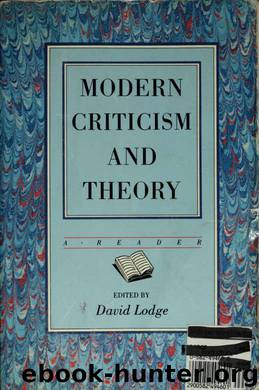Modern criticism and theory : a reader by Lodge David 1935-

Author:Lodge, David, 1935-
Language: eng
Format: epub
Tags: Criticism, Literature, Critique, Literatuurkritiek, Literaturkritik, Literaturtheorie, Quelle, Literature Criticism Theories
Publisher: London ; New York : Longman
Published: 1988-09-05T16:00:00+00:00
Kristeva The ethics of linguistics
commentary: Toril Moi, 'Marginality and Subversion: Julia Kristeva', in Moi's Sexual/Textual Politics (1985)
Allon White, iU L y eclatement du sujet": the theoretical work of Julia Kristeva.' University of Birmingham Centre for Contemporary Cultural Studies Occasional Paper, no. 49 (1977)
The ethics of linguistics
Should a linguist, today, ever happen to pause and query the ethics of his own discourse, he might well respond by doing something else, e.g., engaging in political activity; or else, he might accommodate ethics to the ingenuousness of his good conscience—seeking socio-historical motives for the categories and relations involved in his model. One could thus account for the Janus-like behavior of a prominent modern grammarian; in his linguistic theories he sets forth a logical, normative basis for the speaking subject, while in politics he claims to be an anarchist. Then there are scholars, quite numerous but not so well known, who squeeze into modern linguistic theory a few additional considerations on the role of ideology; or who go no further than to lift their examples out of leftist newspapers when illustrating linguistic propositions.
Now, since the end of the nineteenth century, there have been intellectual, political, and, generally speaking, social ventures that have signaled the outbreak of something quite new within Western society and discourse, which is subsumed in the names of Marx, Nietzsche, and Freud, and their primary goal has been to reformulate an ethics. Ethics used to be a coercive, customary manner of ensuring the cohesiveness of a particular group through the repetition of a code—a more or less accepted apologue. Now, however, the issue of ethics crops up wherever a code (mores, social contract) must be shattered in order to give way to the free play of negativity, need, desire, pleasure, and jouissance [ecstasy], before being put together again, although temporarily and with full knowledge of what is involved. Fascism and Stalinism stand for the barriers that the new adjustment between a law and its transgression comes against.
Meanwhile, linguistics is still bathed in the aura of systematics that prevailed at the time of its inception. It is discovering the rules governing the coherence of our fundamental social code: language, either system of signs or strategy for the transformation of logical sequences. The ethical foundations for this belong to the past: in their work, contemporary linguists think like seventeenth century men, while structuralist logic can be made to work only with primitive societies or their surviving elements. As wardens of repression and rationalizers of the social contract in its most solid substratum (discourse), linguists carry the Stoic tradition to its conclusion. The epistemology underlying linguistics and the ensuing cognitive processes (structuralism, for example), even though constituting a bulwark against irrational destruction and sociologizing dogmatism, seem help-
Download
This site does not store any files on its server. We only index and link to content provided by other sites. Please contact the content providers to delete copyright contents if any and email us, we'll remove relevant links or contents immediately.
| Books & Reading | Comparative Literature |
| Criticism & Theory | Genres & Styles |
| Movements & Periods | Reference |
| Regional & Cultural | Women Authors |
4 3 2 1: A Novel by Paul Auster(12363)
The handmaid's tale by Margaret Atwood(7750)
Giovanni's Room by James Baldwin(7316)
Asking the Right Questions: A Guide to Critical Thinking by M. Neil Browne & Stuart M. Keeley(5751)
Big Magic: Creative Living Beyond Fear by Elizabeth Gilbert(5746)
Ego Is the Enemy by Ryan Holiday(5411)
The Body: A Guide for Occupants by Bill Bryson(5075)
On Writing A Memoir of the Craft by Stephen King(4925)
Ken Follett - World without end by Ken Follett(4718)
Adulting by Kelly Williams Brown(4564)
Bluets by Maggie Nelson(4542)
Eat That Frog! by Brian Tracy(4514)
Guilty Pleasures by Laurell K Hamilton(4437)
The Poetry of Pablo Neruda by Pablo Neruda(4089)
Alive: The Story of the Andes Survivors by Piers Paul Read(4017)
White Noise - A Novel by Don DeLillo(3999)
Fingerprints of the Gods by Graham Hancock(3985)
The Book of Joy by Dalai Lama(3968)
The Bookshop by Penelope Fitzgerald(3842)
